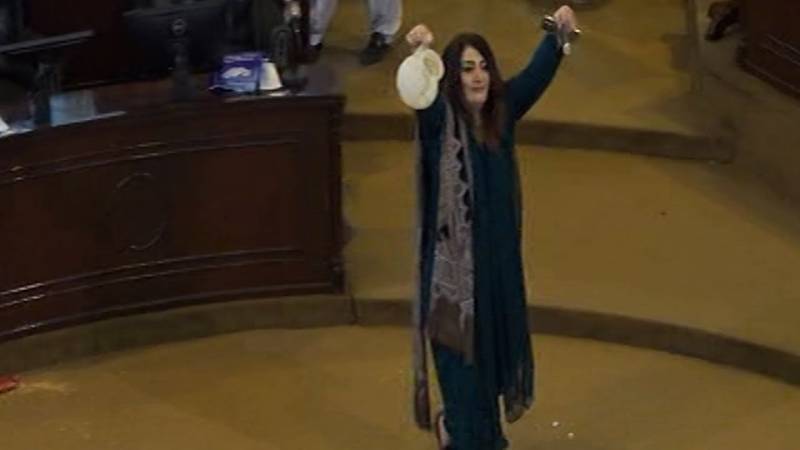
Elections 2024 are over. As it is the age of social media, two videos, both concerning women, went viral in the inaugural week of the new government taking charge.
The first was released by "Team MNS" on Twitter, featuring Maryam Nawaz Sharif, the first female Chief Minister of Punjab, adjusting the dupatta of a woman police officer. Copying Imran Khan's overactive social media team, that never let by an opportunity to brandish his conservative credentials, it appeared that Maryam's amateur squad was appealing to a similar base.
Indeed, several of her supporters, many of them male, thought the gesture was compassionate, maternal, and most of all, a welcome reflection of our traditional values. Others, like myself, weren't so impressed and thought Maryam's job is not to give anyone advice on how they dress, much less take the liberty of invading someone's personal space by touching her clothes and putting a dupatta in its place. It was rather unprofessional, particularly since the video was likely disseminated without the consent of the police officer whose dupatta was the subject of the video.
BBC Urdu asked a poignant question--would those supporting the move be equally comfortable had the police officer dared to fix Maryam's dupatta, if it had slipped? Clearly, the move also had an unsavoury class and hierarchical dimension to it.
Images at Dawn went out of its way to cover the incident. Not only did they write up a piece on it, they recorded a video with their female staffers expressing disapproval. Fair enough. Maryam is Chief Minister now and it's justified to criticise her, particularly if her social media team puts up such unnecessary videos.
But then there was another video. A far more disturbing video. Of the opening session of the Khyber-Pakhtunkhwa assembly. Sobia Shahid, a PML-N MPA from KP, is seen mocking Imran Khan by dangling a wristwatch, an obvious reference to his conviction in the Toshakhana case. Although one can debate the wisdom in her actions, what ensued was nothing short of barbaric.
Shoes, cigarettes and a water cistern (lota) was hurled at her. To say that she was harassed would be a grave under-statement. Later, as she takes her seat in the assembly, she is subjected to the most uncouth verbal abuse and is even threatened with rape. When Chief Minister of KP, Ali Amin Gundapur, a man known for his misogyny, was asked about the incident, he dismissed it by pinning the blame on the victim.
This should not surprise anyone, as this has been PTI's philosophy when it comes to women. In October 2022, Imran Khan blamed journalist Gharida Farooqui when she was harassed. He stated that if a woman willingly goes towards a crowd of men and then says she was harassed, it is like "aa bael mujhe maar".
During his term in office, several prominent female journalists had signed a joint statement demanding that the PTI government restrain its workers from targeting women journalists. In fact, any of us who have been critical of Imran Khan have had an onslaught of derogatory tweets, often littered with sexual innuendo, from the PTI troll factory.
Thus what happened in the KP assembly was an in-person manifestation of the behaviour PTI has been displaying on-line for years. And yet, there was silence from the Dawn team of female staffers who seemed so keen to record a video when Maryam overstepped. Here is a ghastly crime against a Pakistani woman representative. How then can any serious new outlet pretend it never happened?
Imran Khan's statement about Gharida and his fascination with "chadar and chardiwari" goes to the heart of his perception of a woman's place in society. Those who support PTI should know what it stands for and understand why there will never be condemnation from their leadership about what happened to Sobia Shahid.
Calling out PTI on its misogyny does not mean letting PML-N off the hook. Indeed, Nawaz Sharif has also made misogynistic statements about women dancing in PTI rallies, suggesting that he too suffers from regressive notions of a woman's place in society. For surely, he does not have a problem with men dancing to express happiness. So why should it be taboo for women to do the same? Why should women risk sleazy labels if they partake in dancing or singing in public?
In fact, how comfortable women feel in a society is directly proportional to their presence in public, and their ability to partake in all those activities that men can partake in without fear of harassment or disapproval.
Both KP and Punjab lag behind Sindh in this area, and perhaps the main reason for that is that the ruling party in Sindh was led by a woman for several years. It is Maryam's job to bring the same acceptance to a woman's public presence, with or without a dupatta, in Punjab. Sadly, there is no hope for KP on this front as long as it is led by PTI.

